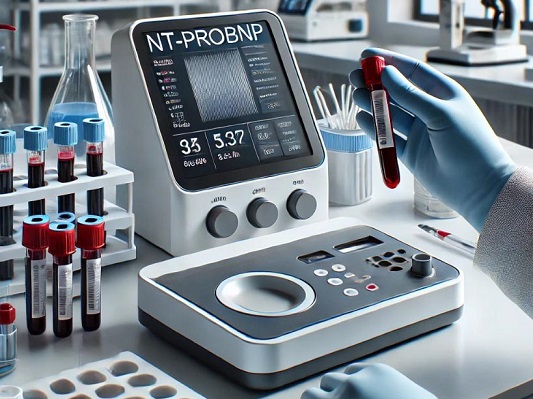NT-proBNP can be used as a biomarker for detecting hidden heart issues after stroke
Nikhil Prasad Fact checked by:Thailand Medical News Team Aug 03, 2024 1 year, 6 months, 2 weeks, 6 days, 6 hours, 37 minutes ago
Latest Diagnostics: Understanding the Role of NT-proBNP
A new study reveals that NT-proBNP, a protein released by the heart during stress, could be a game-changer in diagnosing hidden heart issues, particularly atrial fibrillation (AF), in patients who have suffered cryptogenic strokes. This
Latest Diagnostics news report delves into the groundbreaking findings of a study by researchers from various prestigious institutions and explains their significance in simpler terms for the everyday reader.
 NT-proBNP can be used as a biomarker for detecting hidden heart issues after stroke
What is Atrial Fibrillation and Cryptogenic Stroke?
NT-proBNP can be used as a biomarker for detecting hidden heart issues after stroke
What is Atrial Fibrillation and Cryptogenic Stroke?
Atrial fibrillation is a common heart rhythm disorder that can cause blood clots, stroke, heart failure, and other heart-related complications. It often goes unnoticed until a major event, like a stroke, occurs. Cryptogenic stroke refers to a type of stroke where the cause remains unknown even after extensive medical testing. Detecting AF in these patients can be particularly challenging.
The Study and Its Findings
This article highlights a comprehensive study conducted by researchers from the Global Health Neurology Laboratory in Sydney, the University of New South Wales, Liverpool Hospital in South West Sydney, and the National Cerebral and Cardiovascular Center in Osaka, Japan. They embarked on a mission to assess the effectiveness of NT-proBNP in diagnosing AF in patients with cryptogenic stroke.
The study involved a detailed meta-analysis of seven different studies, encompassing a total of 2,171 patients. Of these, five studies specifically focused on cryptogenic stroke patients. The researchers found that NT-proBNP showed a diagnostic accuracy of 80% for detecting AF in these patients, with a sensitivity of 81% and a specificity of 68%.
Why NT-proBNP is Important
NT-proBNP (N-terminal prohormone of brain natriuretic peptide) is a fragment of a protein released by the heart in response to changes in pressure that occur when heart failure develops and worsens. It is already used in diagnosing and managing heart failure. The study's findings suggest that this biomarker could also be crucial in identifying patients with AF, especially those who have had a cryptogenic stroke.
Implications for Patient Care
The findings indicate that NT-proBNP could be instrumental in guiding the selection of patients for extended cardiac monitoring. This is particularly beneficial for patients who might otherwise be overlooked for more intensive monitoring due to the cryptogenic nature of their stroke. Early and accurate detection of AF could lead to timely treatment with anticoagulants, potentially reducing the risk of recurrent strokes.
Detailed Study Insights
The study conducted by Dr Jay Patel and Dr Sonu M. M. Bhaskar, alongside their teams, involved rigorous analysis and cross-referencing of data from multiple sources. They meticulously sc
reened studies from databases like PubMed, Embase, and Cochrane, ultimately including seven studies in their meta-analysis.
These studies varied in their methodologies but shared common goals of evaluating NT-proBNP levels in stroke patients and correlating these levels with the presence of AF. The pooled data provided a robust basis for concluding NT-proBNP's effectiveness as a diagnostic tool.
Broader Implications and Future Research
The potential for NT-proBNP as a diagnostic marker extends beyond just cryptogenic stroke patients. The study also explored its effectiveness in patients with strokes of known etiology, where it showed even higher diagnostic accuracy. This broader applicability underscores the need for further research to standardize NT-proBNP testing in clinical practice.
Conclusion
The findings from this study represent a significant step forward in stroke management and cardiac care. By utilizing NT-proBNP as a diagnostic tool, healthcare providers can better identify patients at risk of AF and tailor their treatment plans accordingly. This proactive approach could lead to improved outcomes and reduced recurrence of strokes.
The study findings were published in the peer-reviewed journal, Pathophysiology.
https://www.mdpi.com/1873-149X/31/3/24
For the
Latest Diagnostics News, keep on logging to Thailand Medical News.
Read Also:
https://www.thailandmedical.news/news/covid-19-causes-blood-dna-methylation,-a-potential-biomarker-for-long-covid-severity
https://www.thailandmedical.news/news/new-biomarker-discovered-for-progressive-pulmonary-fibrosis
